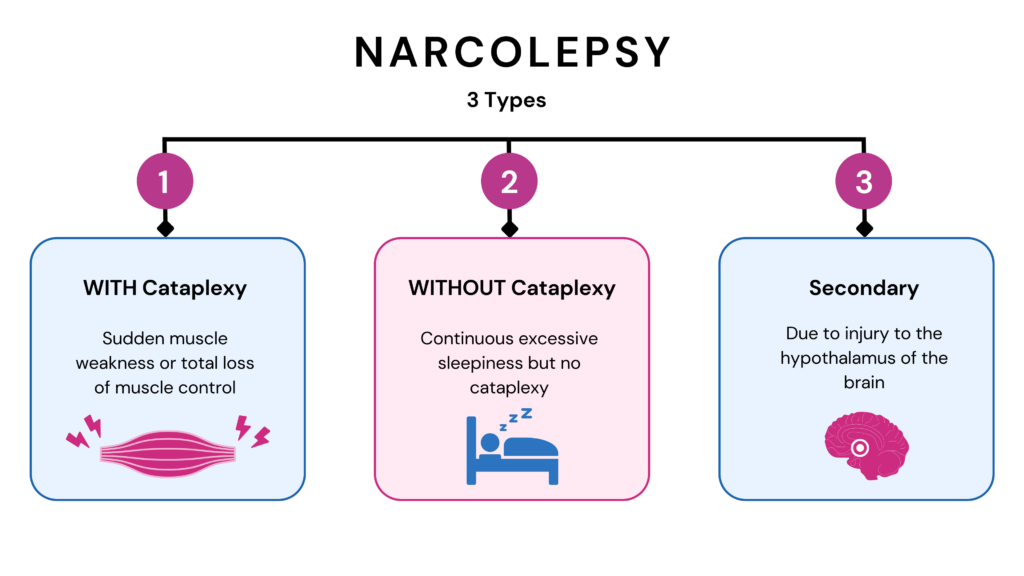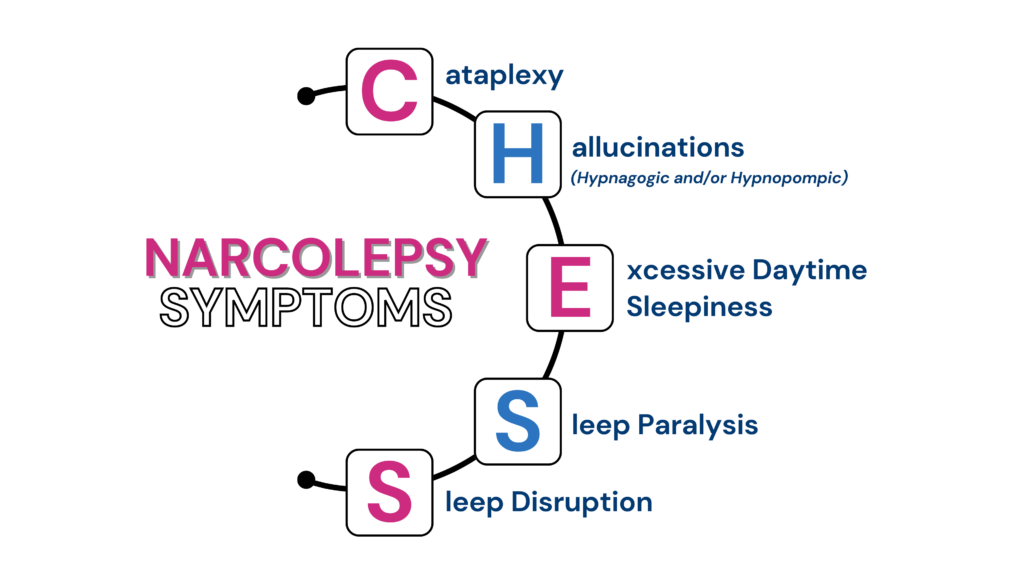Imagine a life where you feel like you're in a constant battle against sleep. If you find yourself plagued by uncontrollable sleep attacks and a constant feeling of tiredness, you might be aware of the condition called “narcolepsy.” This article aims to explore the science behind this condition and answer the question, “Is narcolepsy genetic?” Further, it also touches upon how you can evaluate your genetic risk for narcolepsy and how to manage excessive sleepiness.
Did You Know?
Many sleep parameters like sleep duration, sleep quality, and chronotype and sleep disorders like snoring, obstructive sleep apnea, and narcolepsy have a genetic component to them. Here’s how you can learn your genetic risk.
What Is Narcolepsy?
Narcolepsy is a neurological sleep disorder that can cause excessive daytime sleeping and sudden sleep attacks.
People with narcolepsy have intense urges to fall asleep at random times, like eating or driving.
According to Narcolepsy Network, one in every 2000 Americans is diagnosed with narcolepsy.
Across the world, about three million individuals are affected by the condition.
However, according to experts, only 25% of patients with this condition get diagnosed and treated.
So the total population living with the condition could be much higher.
Types Of Narcolepsy

There are three types of narcolepsy identified.
Type 1 Narcolepsy
Type 1 narcolepsy is also called narcolepsy with cataplexy.
Cataplexy is a condition that causes loss of control of muscles or muscle weakness due to a strong emotion like surprise or anger.
These individuals have low levels of the brain hormone termed hypocretin and experience sleep paralysis and excessive daytime sleepiness.
Type 2 Narcolepsy
Type 2 narcolepsy is narcolepsy without cataplexy.
These individuals don’t experience cataplexy and sleep paralysis and have normal hypocretin levels.
While they still experience sleep paralysis, the symptoms are less severe.
Secondary Narcolepsy
Secondary narcolepsy results from an injury to the hypothalamus region in the brain.
The hypothalamus region of the brain helps regulate sleep.
The symptoms of secondary narcolepsy could be very similar to type 1 or type 2 narcolepsy.
The 5 Signs Of Narcolepsy
Here are five common signs of narcolepsy.
- Cataplexy - inability to control muscles.
- Excessive day sleepiness - falling asleep randomly and feeling extremely sleepy and tired during the day.
- Sleep paralysis - inability to move or react while falling asleep.
- Hallucinations - about one-third of people with narcolepsy experience hallucinations in terms of visuals, sound, or physical sensations while falling asleep and during sleep.
- Sleep disruptions - people with narcolepsy have interrupted sleep and wake up often during their day and night naps.

Who Are Most At Risk For Narcolepsy?
The following are some of the common risk factors for developing narcolepsy.
Age
While narcolepsy can be diagnosed at any age, the symptoms commonly start in adolescence, between the ages of 7 and 25.
Family History
A family history of narcolepsy increases the risk of developing the condition by 20-40%.
Autoimmune Disorders
In the case of type 1 narcolepsy, certain autoimmune disorders may be a risk factor.
Some autoimmune disorders may affect the brain cells and decrease the production of the hormone hypocretin, leading to sleep disorders like narcolepsy.
Brain Injuries
People with brain injuries have a higher risk of developing secondary narcolepsy.
Other Narcolepsy Risk Factors
- Sarcoidosis - an inflammatory condition that can affect the nervous system.
- Brain stroke - a stroke in the brain can affect the hypothalamus region and cause narcolepsy.
- Upper airway infections - certain upper airway infections caused by H1N1 or streptococcus may trigger an autoimmune response, damaging hypocretin-producing cells.
- Infections before puberty - a 2007 article reports that flu infections and fever before puberty increased the risk of developing narcolepsy in patients.
What Causes Narcolepsy?
A combination of genetic changes and environmental triggers leads to narcolepsy.
The risk factors mentioned above can increase a person’s probability of developing the condition.
Is Narcolepsy Genetic?
Test For Narcolepsy Risk Using Your Ancestry DNA Results
Genetic mutation is undoubtedly a factor that can cause narcolepsy.
Gene mutations, along with specific environmental triggers like infections, can lead to the development of this condition.
Genes Underlying Narcolepsy
TNFSF4 gene (TNF Superfamily Member 4 gene)
The TNFSF4 gene contains instructions to produce a protein that plays a role in the immune function.
Certain changes in this gene can result in increased levels of the immune system protein.
When this happens, the excess immune cells can attack the brain cells that produce hypocretin, an important regulator of sleep-wake cycles.
This can result in an increased risk of narcolepsy.
CCR1/CCR3 gene (C-C motif) receptor 1/C-C motif) receptor 3 gene)
The CCR1/CCR3 gene is responsible for the production of chemokines that play a role in the inflammatory response in the body.
Chemokines are signaling proteins that stimulate the movement of white blood cells and immune responses.
Changes to the inflammatory responses can increase narcolepsy risk.
CPT1B gene ( Carnitine Palmitoyltransferase 1B gene)
CPT1B is a gene that plays a role in beta-oxidation in the body. This is a 4-step process that helps break down fatty acids.
Research suggests that fatty acid oxidation is increased during sleep, and mutations in fatty acid metabolism alter REM sleep.
This way, certain changes in the CPT1B gene can influence the risk for narcolepsy.
How’s Narcolepsy Inherited?
According to the National Institute of Neurological Disorders and Stroke, about 10% of people with type 1 narcolepsy may have close relatives with similar symptoms.
About 1-2% of the population inherit the condition from their ancestors.
Can I pass narcolepsy to my child?
According to experts, in rare cases, narcolepsy may be inherited across generations.
However, most cases occur randomly and are not passed on.
Is narcolepsy something you're born with?
Some individuals may be born with certain gene mutations that affect hypocretin production in the brain, causing narcolepsy.
In most cases, damage to these hypocretin-producing brain cells may occur randomly due to environmental triggers, leading to the condition.
Understanding Your Genetic Risk For Narcolepsy
Genetic testing may identify a person’s risk for type 1 narcolepsy.
A blood test can help find out whether you have genetic markers associated with narcolepsy.
A positive result supports a diagnosis but does not make it 100% certain
Many people without narcolepsy also have these genetic markers.
Certain direct-to-consumer genetic companies also help analyze your already existing DNA data to check several markers linked to narcolepsy risk.
No Ancestry DNA Test Results? No Problem
Here's how you can still get your narcolepsy report
Is There Any Treatment For Narcolepsy?
Narcolepsy cannot be cured and can only be managed with the right treatments.
The following drugs are common options for narcolepsy management.
Stimulant Drugs - stimulant drugs stimulate the nervous system and help prevent excessive daytime sleepiness. Common stimulants include sodium oxibate, pitolisant, and modafinil.
SNRIs And SSRIs - Serotonin and Norepinephrine Reuptake Inhibitors (SNRIs) and Selective Serotonin Reuptake Inhibitors (SSRIs) are medicines used to suppress the sleep REM cycle and handle the symptoms of narcolepsy.
TCAs - Tricyclic Antidepressants (TCAs) can help handle cataplexy but come with possible side effects. So discuss with your doctor before choosing TCAs.
Tips To Manage Narcolepsy
Good Sleeping Habits
Creating good sleeping habits like the following may help handle the condition well.
- Go to bed and wake up at the same time every day.
- Practice relaxation techniques before bedtime at night so the frequency of waking up reduces.
- Create an inviting nighttime sleeping environment.
- Avoid caffeine or alcohol after sunset to help get a good night’s sleep.
Taking scheduled Naps
The main problem people with narcolepsy have is excessive sleepiness in the daytime.
A trick to managing this is taking scheduled naps of 20-30 minutes throughout the day to stay awake during the other times.
Regular Exercises
A 2018 study reports that physical activity improves night-sleep duration, reduces the frequency of day naps, and enhances the quality of sleep in narcolepsy type 1 patients.
Summary: Is Narcolepsy Genetic?
- Narcolepsy is a neurological sleep disorder resulting in excessive day sleepiness and the inability to control daytime naps.
- There are three types of narcolepsy – type 1, type 2, and secondary.
- Narcoleptic individuals wake up often at night and can get shocked into sleep due to strong emotions.
- Family history, age, and certain infections can all increase a person’s risk of developing narcolepsy.
- Mutations in the TNFSF4, CCR1/CCR3, and CPT1B genes can cause narcolepsy.
- Narcolepsy is passed on across generations in about 1-2% of families. Genetic testing may help understand a person’s risk of developing narcolepsy and passing mutated genes to their offspring.
- There's no treatment for narcolepsy; however, people can manage it with medications and sound sleeping and lifestyle habits.
Get Your Genetic Test For Narcolepsy
References For Is Narcolepsy Genetic
- https://pubmed.ncbi.nlm.nih.gov/18043003/
- https://pubmed.ncbi.nlm.nih.gov/22471619/
- https://pubmed.ncbi.nlm.nih.gov/14527309/
- https://www.nhlbi.nih.gov/health/narcolepsy
- https://www.ninds.nih.gov/health-information/disorders/narcolepsy#toc-who-is-more-likely-to-get-narcolepsy-
- https://www.ninds.nih.gov/health-information/disorders/narcolepsy#toc-who-is-more-likely-to-get-narcolepsy-
- https://www.ncbi.nlm.nih.gov/books/NBK22236/
- https://www.ncbi.nlm.nih.gov/books/NBK22236/
- https://pubmed.ncbi.nlm.nih.gov/25986216/
- https://pubmed.ncbi.nlm.nih.gov/18820697/
- https://www.ncbi.nlm.nih.gov/gene/1230
- https://www.ncbi.nlm.nih.gov/gene/1375
- https://www.ncbi.nlm.nih.gov/pmc/articles/PMC6117389/
- https://www.ncbi.nlm.nih.gov/books/NBK22236/
- https://medlineplus.gov/genetics/condition/narcolepsy/
- https://www.nature.com/articles/s41439-018-0033-7
- https://academic.oup.com/sleep/article/43/11/zsaa099/5842137?login=false
- https://rarediseases.org/rare-diseases/narcolepsy/






